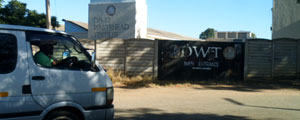
WIDOWED 62-year-old Gogo Elizabeth Maruma is filled with a sense of nostalgia when she recounts the tale of a once vibrant City of Kadoma which now faces an uncertain future owing to the death of industry in this part of the country.
Report by Blessed Mhlanga
After living most of her life here Gogo Maruma is at pains to understand how Kadoma is now a shell of its former self with industry and agriculture, which formed the nerve centre of business, now reduced to flea markets and uncontrolled gold panning.
“David White Head Textiles (DWHT) went down with the future and pride of this city, its collapse has brought untold suffering to many families and young ones have now been forced into prostitution and gold panning for survivial,” she said.
Her husband Brown Togarasei passed on after dedicating 45 years of his life to the former cloth manufacturing giant DWHT which at its peak employed over 1 000 workers.
The late Togarasei left the company with nothing, no gratuity or savings and his other pension contributions disappeared, Gogo Maruma was left with six children and now takes care of her grandchildren, but only gets a paltry $20 per month from NSSA pensions.
The collapse of DWHT had a serious ripple effect on the entire city because most of the industry in Kadoma was tied to its existence and Gogo Maruma is not alone in praying that the giant wakes up from its deep slumber.
National attention has been turned to Ziscosteel and Redcliff which have been painted as home of the most suffering, but Kadoma is deeper in the dung of poverty with virtually no industry to talk about. Former executive mayor Fani Phiri says Kadoma’s industry collapsed following the fall of DWH and as a result, residents and ratepayers of Kadoma were now failing to pay for basic service delivery.
- Chamisa under fire over US$120K donation
- Mavhunga puts DeMbare into Chibuku quarterfinals
- Pension funds bet on Cabora Bassa oilfields
- Councils defy govt fire tender directive
Keep Reading
“Council is owed over $10 million by residents and ratepayers, these people are not paying not because they don’t want. There is no money owing to industry collapse here, Kadoma has now been reduced to flea markets and small businesses which are even struggling to pay their own workers,” he said.
Phiri, who is spoiling to run for Parliament on a Zanu PF ticket, says only government can help bring back Kadoma from the doldrums to which it is headed because without central government intervention he social services would collapse.
“Everyone knows that this is the city of white gold (cotton) and the collapse of agriculture, DWH and industry in this town has left everyone here destitute and we can’t revive this city without government help,” he says.
“Council cannot offer the basic service delivery because nobody can pay for that service and without resuscitating industry, attracting foreign investment then forget about yesteryear glory.”
Kadoma was hit the hardest by a cholera outbreak which pulversied the nation in 2008 owing to a total collapse of water and sewer reticulation systems.
According to Mayor Peter Matambo, at that time, more than 80% of its population was practising open defection and fetching water from shallow wells around Rimuka and Munhumutapa.
“Entire families were wiped out here, every day there was a funeral in Rimuka, people were buried like dogs, no paying of last respects, nothing, just throwing people in to graves. It is a painfull moment of our history which needs not be repeated,” he said.
Businesspeople, vendors and the general people in Kadoma are united in thinking that only the resuscitation of DWH can bring back normalcy and decency, which is all but lost in this community.
Shelton Cleanbon, a DWHT retrenchee now living from hand to mouth, says elections in 2013 hold his last hopes, saying he prays that the next government will priorities the interests of its people ahead of power and greed.
Cleanbon was retrenched with a promise he would be paid $1 762,00 as his package, but only got $300, while he prays his debt will be paid, he is more interested in DWH reopening.
“It has to reopen so that we can go back to work, just getting my money won’t help me because that money won’t even be enough to settle my debts. I owe council over $500 in rates, my ZESA bill runs to $600 and my child has to go to school,” he explained.
Talking of his friends whom he used to work with at DWHT, Cleanbon said grown man have been reduced to hunting for mice, which they resale to earn a living.
“They are now selling mice (an African delicacy) just to get a few dollars to get by, some have become firewood barons because most of the homes here are without electricity so firewood is a fast moving commodity,” he says.
He does not even remember the last time he visited his parents in Mhondoro–Mubaira because he can’t even afford bus fare or a few groceries for his own kith.
Brown Bangu, who is now surviving on moulding bricks, walked out of DWHT frustrated over unpaid salaries. Most of his customers are crossborder traders and gold dealers and panners.
“These are the only people with enough money to build houses, otherwise the rest are just destitutes forced to look for houses to rent every month after being sacked for failing to pay rentals,” he says.
Bangu said after working 25 years as a machine operator at DWHT, he has no pension to talk about, neither was he given a package when he left.
“All my contributions disappeared and nobody could explain to me what happened, but every month money was being deducted from my payslip. I am hoping that the government that comes into power will have respect for us and ensure we get all we lost,” he said.











